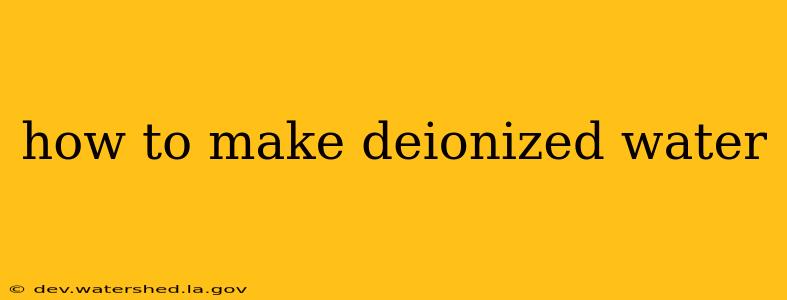Deionized (DI) water, also known as demineralized water, is water that has had its mineral ions removed. This process significantly reduces the water's electrical conductivity, making it ideal for various applications where impurities can be problematic. While you can't easily make truly high-purity DI water at home, understanding the process and available options is crucial. This guide will explain the methods used to create deionized water, their effectiveness, and considerations for different uses.
What is Deionization?
Deionization is a water purification process that uses ion-exchange resins to remove dissolved ions like minerals (calcium, magnesium, etc.), salts, and other impurities. These resins contain negatively charged functional groups that attract and bind positively charged ions, and vice versa. The result is water with very low levels of dissolved solids and a significantly higher resistivity (a measure of how well water resists the flow of electric current).
Methods for Making Deionized Water
While large-scale deionization uses sophisticated systems, understanding the principles allows us to assess home-based options:
1. Distillation
Distillation is a common method that involves boiling water and collecting the condensed steam. As minerals and other impurities have higher boiling points than water, they are largely left behind. Distilled water is a good starting point, but it may still contain some volatile impurities. It's not true deionization, but it significantly reduces the mineral content, increasing its resistivity.
Pros: Relatively simple at home, readily available equipment. Cons: Slow process, energy-intensive, doesn't remove all impurities.
2. Reverse Osmosis (RO)
RO systems use pressure to force water through a semipermeable membrane, leaving behind impurities. While not strictly deionization, RO significantly reduces the total dissolved solids (TDS) in water, resulting in water with higher resistivity. This is a much more effective method of impurity removal than distillation.
Pros: More effective than distillation at removing impurities, commercially available units are readily available. Cons: Requires a significant amount of water pressure, and membrane replacements can be expensive.
3. Ion Exchange Resins (For Advanced Users)
This method directly mirrors industrial-scale deionization. However, accessing and safely using ion-exchange resins at home is challenging. These resins need specific regeneration processes using strong acids and bases, posing significant safety hazards. Improper handling can lead to chemical burns and environmental pollution. It's strongly advised against attempting this method without extensive chemical handling experience.
Pros: Potentially produces high-purity water (if done correctly). Cons: Extremely dangerous if not done with proper safety equipment and procedures, resin disposal is also an environmental concern.
Choosing the Right Method for Your Needs
The best method for making deionized water depends on your specific needs and resources:
- Low-level purity needed: Distilled water from a home distiller is sufficient for applications like car batteries or irons.
- Higher purity required: A reverse osmosis system will provide better quality than simple distillation.
- Highest purity, specialized applications: Industrial-grade deionization is necessary and should be left to professionals using appropriately equipped laboratories.
How to Test Your Water's Purity
Measuring the resistivity or TDS of your water helps determine its purity. Resistivity meters provide a direct measure of how well the water conducts electricity, indicating the level of dissolved ions. TDS meters measure the total amount of dissolved solids. Higher resistivity and lower TDS indicate purer water.
What are the Uses of Deionized Water?
Deionized water has various applications, including:
- Scientific research: Prevents interference from impurities in experiments.
- Automotive batteries: Maintains battery life and performance.
- Steam irons: Prevents mineral buildup and damage.
- Aquariums: Some sensitive fish species require deionized water.
Can I Buy Deionized Water?
Yes, deionized water is readily available from many stores that sell automotive supplies and scientific equipment. Purchasing DI water is often simpler and safer than attempting to produce it at home, especially for applications requiring high purity.
By understanding the various methods and their limitations, you can make informed decisions about how to obtain deionized water for your specific needs, prioritizing safety and efficacy. Remember, always handle chemicals with caution and seek professional guidance when dealing with processes that involve potentially hazardous materials.
